 Petzlover
Petzlover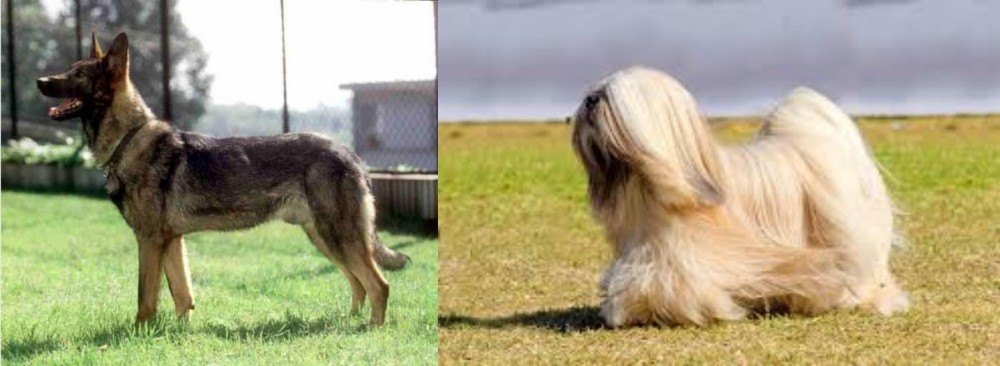 Both Kunming Dog and Lhasa Apso are originated from China. Kunming Dog may grow 40 cm / 16 inches higher than Lhasa Apso. Kunming Dog may weigh 30 kg / 67 pounds more than Lhasa Apso. Both Kunming Dog and Lhasa Apso has same life span. Both Kunming Dog and Lhasa Apso has almost same litter size. Both Kunming Dog and Lhasa Apso requires Moderate Maintenance.
Both Kunming Dog and Lhasa Apso are originated from China. Kunming Dog may grow 40 cm / 16 inches higher than Lhasa Apso. Kunming Dog may weigh 30 kg / 67 pounds more than Lhasa Apso. Both Kunming Dog and Lhasa Apso has same life span. Both Kunming Dog and Lhasa Apso has almost same litter size. Both Kunming Dog and Lhasa Apso requires Moderate Maintenance.
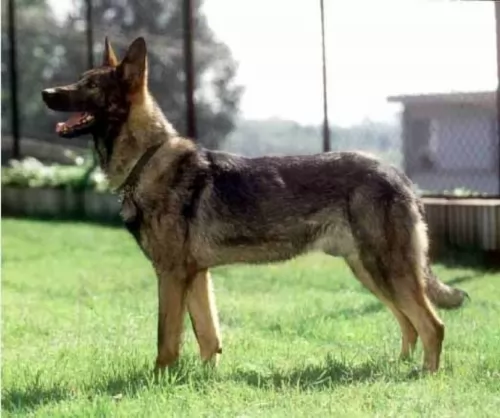 Known also as the Kunming Wolfdog, the Kunming Dog is similar in looks to the German Shepherd Dog, but the coat is recognizably shorter.
Known also as the Kunming Wolfdog, the Kunming Dog is similar in looks to the German Shepherd Dog, but the coat is recognizably shorter.
It’s an attractive looking wolf-like dog which comes from China. It isn’t quite clear which dog breeds were used in the gene pool for these Kunming wolfdogs. You can see though that the German Shepherd as well as other wolfdog-crosses have played a part in the breed's origin.
The dog was created in the early 1950s for military- and guard dog purposes. In 1988, the Chinese Public Security Bureau officially recognized the Kunming Dog as a breed. Today, the dog is still used in military and police services.
 The Lhasa Apso is a non-sporting dog hailing from Tibet. He was a useful dog to the monks who would use him in the palaces as well as the monasteries to ward off intruders.
The Lhasa Apso is a non-sporting dog hailing from Tibet. He was a useful dog to the monks who would use him in the palaces as well as the monasteries to ward off intruders.
He actually takes his name from the holy city of Lhasa, with the history of the breed going back to 600BC.
Today he is a true companion dog, a family dog, known as as the Tibetan Apso, the Bearded Lion Dog, the Apso and Lhasa.
The dog has been recognized by the American Kennel Club in 1935, in the Non-Sporting Group category.
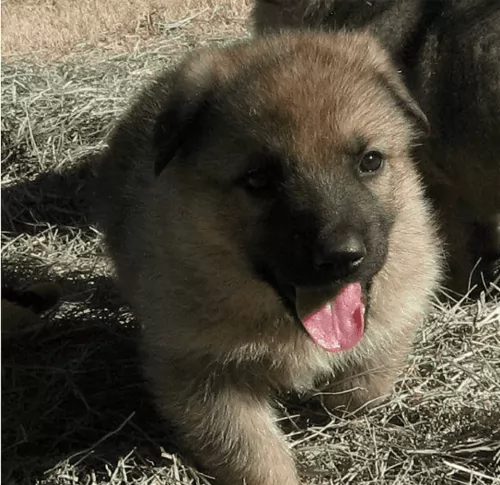 The Kunming is a large dog, athletic and muscular, standing at 60 – 68cm and weighing 30 – 38kg. They are dogs which fall under the Spitz type category.
The Kunming is a large dog, athletic and muscular, standing at 60 – 68cm and weighing 30 – 38kg. They are dogs which fall under the Spitz type category.
The dog has a coat which is considered seasonal - double layered in the cooler months and shedding to a shorter coat in the hotter months. The thick coat can be a light tan color to white and he has a black saddle pattern, giving the dog an overall black and tan combination.
The bushy tail is long and its carried down and low except when the dog is excited and alert, then it lifts its tail. The ears are erect like that of the German Shepherd or Wolf.
He isn’t the best breed for a first time owner as he is very strong willed and can tend to become aggressive. It is why he has been used to perform tasks in the military.
These dogs are known for their alertness, and to keep him mentally balanced and amicable, he will need a strong, firm owner who is also fair, patient and consistent. Bored and frustrated, a Kunming can become unpredictable and a first time dog owner might not be able to cope with such an independent, strong-willed, determined, confident dog.
He is also energetic and intelligent, making a great family dog as he is loyal, loving and devoted. His intelligence allows him to learn easily too. Training and socialization will be required if you want him to be obedient.
He is adaptable and can adjust to life in the city or the countryside, but essentially he is better suited to a home with large grounds as he is a dog which is full of energy.
 Lhasa Apsos are small dogs which stand at between 25 to 28cm in height and weigh in the region of 6 to 8kg.
Lhasa Apsos are small dogs which stand at between 25 to 28cm in height and weigh in the region of 6 to 8kg.
The body length of the dog is longer than the height of the dog. He has brown eyes, a black nose and medium length, floppy ears. The long tail is carried over the dog's back.
Many people get used to seeing a sheared or clipped Lhaso, so when they see a dog where the coat has been left uncut they can’t believe the long, straight, dense coat.
Because the dog hails from Tibet where the weather can be extremely cold, he has a double coat – an under- and outer coat. While the coat looks fairly silky, it isn’t really and is in fact quite course to the touch.
Colors of the coat can be gold, tan, cream, white, black and white. Regular brushing will be needed for the coat because this is a dog with continual shedding. These dogs are regarded as being hypoallergenic as they hardly shed.
Looks can be quite deceiving when it comes to the Lhasa Apso as he is a dog who looks as though butter wouldn’t melt in his mouth and that he is essentially just a cuddly lapdog.
This small little dog is tough, robust, strong-willed and in his heart he believes he is a huge Tiger.
He’ll make his human family a loyal and loving pet but he is wary with strangers, distrusting anyone he meets for the first time. He is a dog that will need to be trained and socialized as he may take over your home in his ‘Tiger’ role.
Smart and dominant, this training will turn him into an obedient dog to have around which is important as he can become bossy if left to go his own way.
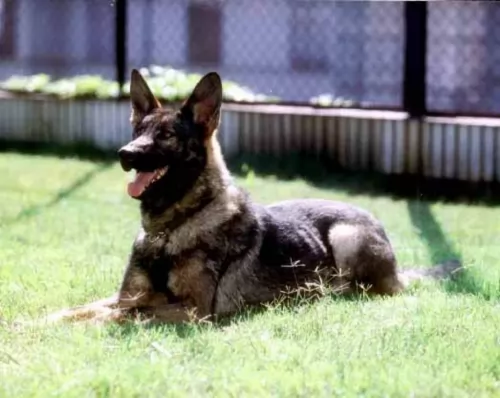 Your attractive Kunming dog is an energetic, lively dog who is going to require a good deal of exercise as he was developed to be a working dog.
Your attractive Kunming dog is an energetic, lively dog who is going to require a good deal of exercise as he was developed to be a working dog.
They are loving towards their human families and even well behaved with other dogs in the family. He will however need socialization and training from a firm, fair, consistent owner.
Provide him with a loving environment, lots of exercise, wholesome food, a warm, dry place to sleep and lots of mental and physical stimulation, and you’ll have a wonderful, contended pet and companion.
 The Lhasa Apso is a small dog full of surprises. That's because he can be manipulative, naughty and feisty one minute, and sweet and gentle the next. He happens to be a good watch dog too, and will alert you well in advance to intruders.
The Lhasa Apso is a small dog full of surprises. That's because he can be manipulative, naughty and feisty one minute, and sweet and gentle the next. He happens to be a good watch dog too, and will alert you well in advance to intruders.
Because he is small and not a particularly energetic dog, he can slot into life in the city or the countryside with ease. However, exercise is good and necessary for every dog so be sure he joins you on your daily walks or you give him some games indoors.
The Lhasa can be a wonderful family companion and you’ll find that he can get on well with children who have been taught to treat animals with kindness and respect. He isn’t the kind of dog that you keep outdoors but is essentially an indoor dog, relishing the time he spends with his beloved human family and making a wonderful companion.
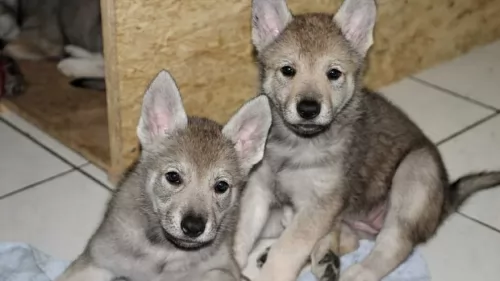 Your Kunming can reach 12 to 14 years of age if he is loved, fed correctly and adequately exercised. Just as with any dog, he can be susceptible to some of the common dog illnesses. These include the likes of hip dysplasia, bloat, epilepsy, eye problems, ear infections, intestinal parasites, heart disease and skin problems.
Your Kunming can reach 12 to 14 years of age if he is loved, fed correctly and adequately exercised. Just as with any dog, he can be susceptible to some of the common dog illnesses. These include the likes of hip dysplasia, bloat, epilepsy, eye problems, ear infections, intestinal parasites, heart disease and skin problems.
Worms are a chronic problem in dogs and the thing is, they can infect humans too. If you don’t treat worms in your dog, it can lead to your pet becoming seriously ill. You may notice loss of appetite, a dull, thinning coat, anemia and diarrhea.
The vet will be able to offer a treatment that can help with eradicating hook-, round- and tapeworms.
This may sound like a mild dog disease but it can cause a lot of misery for your pet. You’ll notice your pet licking, scratching and biting at raw, red spots on his skin. With bacterial- or yeast infections, your pet can battle with itchiness, pain and discomfort. Luckily your vet can recommend treatments to effectively alleviate symptoms.
 Every dog can develop genetic health problems, but it is highly unlikely that with good care, your Lhasa Apso is going to get sick.
Every dog can develop genetic health problems, but it is highly unlikely that with good care, your Lhasa Apso is going to get sick.
He’s a healthy dog breed that can get to 14 years of age and even older. With Lhasas, health problems can include things like hip dysplasia, eye problems and intervertebral disc disease.
If you are buying a puppy, be careful from where you buy him from. You want careful breeders who screen their parent dogs for genetic diseases. Keeping your dog at the right weight and preventing obesity will also help to ensure he remains healthy.
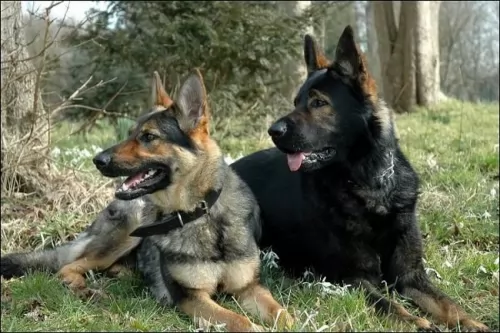 Grooming for the thick coat should be done regularly. The dog sheds quite a bit and seasonally and you'll want to brush him twice a week to rid the coat of those loose hairs.
Grooming for the thick coat should be done regularly. The dog sheds quite a bit and seasonally and you'll want to brush him twice a week to rid the coat of those loose hairs.
The Kunming Dog is high energy and will therefore suit a family who is active and sporty. He is the kind of dog that you can include in all your activities – walks, hikes, running next to you when you go cycling and swimming.
This is an active dog and you want the best food for him, packed with vitamins and minerals to keep him lively and energetic. Instead of giving him one large meal a day that he gulps down quickly, split his food into 2 smaller meals.
Your dog’s age, his breed and his energy levels will direct you as to how to feed him.
Remember, that although commercially manufactured dog foods need to comply with certain standards, it doesn't guarantee their goodness. It may not be digestible for your pet. If you want to use one of these foods, choose the best there is and try to mix in some wholesome home-made food from time to time.
Cooked chicken, brown rice or pasta and some raw or cooked vegetables can be excellent for him as well as adding in some raw meat occasionally.
 The Lhasa Apso is going to require regular brushing of his coat as it can get long and then it will matt and tangle easily.
The Lhasa Apso is going to require regular brushing of his coat as it can get long and then it will matt and tangle easily.
There are owners of this dog breed who prefer to send their dog to their grooming parlor where the coat is trimmed short the way they prefer, minimizing the time spent grooming the dog. At the grooming parlour they also check the ears, the teeth of the dog and the nails, particularly if they don’t wear down naturally.
The Lhasa was bred to be a watchdog, so even though he is a small dog, he does his best to guard and protect you. He is no pushover, and training him and socializing him makes him even more adorable to be around.
As man’s best friend, he needs a high-quality, nutritious diet because this helps to protect him from disease. You can feed him the best commercially manufactured foods, but study the packaging details on what the ingredients are. You want to be avoiding corn and wheat, colorants and preservatives.
Your Lhasa has 4 – 6 puppies and as these get older and are weaned they will require 4 meals a day. Once your dog reaches one year of age, he can have 2 meals a day instead of one larger meal.
Every dog loves a little bit of home-made food as a treat, and your Lhasa will wag his tail when you add in some cooked chicken, brown rice and some raw or cooked vegetables into his kibble. Include some raw meat in the diet occasionally as well as this helps to avoid dog skin problems.
Folliculitis is a skin disease starting in the hair follicles of the dog and often occurs in conjunction with other skin disorders like mange. It is found mostly on the dog's abdomen, his armpits and groin and you’ll notice scaly rings with pus and scabs.
To avoid nasty skin diseases which can be very distressing for your pet, remember that your dog's dietary intake plays a huge role in the maintenance of a healthy skin and some raw meat is key to his wellbeing.